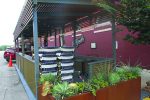Council extends alcohol sales until 2 a.m.
By Miranda Rogers
POST-REGISTER
After being addressed and denied in December of 2010, the proposal to extend the sale of alcohol by licensed businesses until 2 a.m. has reached council again, with resounding consensus from the Lockhart populace.
Paulette Hayter, owner of Cedar Hall Bar and Grill, emailed Mayor Lew White recently on behalf of
several citizens who would like to see more of Lockhart’s potential to grow. Citizens like Joel Gammage, Stephen Collins, Catrin Bennett and Janet Christian said they wanted to be able to stay in Lockhart when going out for live music or dancing, and considered the opportunity for artistic growth to be economically beneficial for the entire city.
Even entities like Lilly’s Bar and volunteer-based festivals that admitted would probably opt out of staying open until 2 a.m. showed interest in simply having the opportunity available for other businesses.
Larry Houseton and former councilmember Kenny Roland added their support, reminding the council that TABC had no problem with shutting down any business that got out of hand.
According to the ordinance, licensed businesses have the option to stay open until 2 a.m. every night at the discretion of the owner, but are not required to do so.
White has pledged greater enforcement in the areas of local “club” establishments, particularly those in residential areas, to keep them safe and free of incidents, and added that council will be able to remove the ordinance if necessary.
Councilmembers including Councilmember Richard Banks, who was steadfastly against the proposal when it came forward previously, agreed that the community is ready for this change. An ordinance will be drafted for final approval for the next City council meeting, and will try to address the concern of bars next to residential and mixed-use areas that was brought up by downtown resident Caroline Rowe.
Final approval will be held on the first meeting in March.
In other business, Banks recently asked City Manager Vance Rodgers to investigate an ordinance that would help reduce “abusive” and “predatory” lending practices by businesses located within the city limits, focusing primarily on what were called “loan sharks,” or payday and small title loan companies that attach high interest rates to short-term loans for individuals.
For the purpose of discussion, Rodgers brought forth an ordinance used by the City of San Antonio.
Because high interest rates could become predatory, the ordinance addresses refinancing practices that are against the law. Even though it was Banks who requested the item be on the agenda, he admitted that it “might be a waste of time to even try” to use the ordinance because you “can’t stop people from doing stupid things.”
Still, Banks showed his favor of regulating the loan practices in the hopes that the ordinance “would help protect people from their own foolish decisions.”
Councilmember Paul Gomez questioned the overall necessity of the ordinance, worried that the new ordinance will affect the city’s finances negatively if more staff is needed to enforce the duties. Rodgers and City Attorney Peter Gruning will consult with District Attorney Trey Hicks to determine if what the city already has in place is adequate, or if they need to go further.
Research will be conducted by the second meeting in March.
In brief news:
City Council has allocated $59,990 of the Hotel Occupancy Tax funds, based on the percentages that the organizations received in 2012. Lockhart Chamber of Commerce will receive 59 percent or $35,394. Hispanic Chamber of Commerce will receive 19 percent, or $11,398. Gaslight Baker Theatre will receive 14.6 percent, or $8,759. Caldwell County Museum and Southwest Museum of Clocks and Watches will each receive 3.7 percent or $2,220.
Finance Director Jeff Hinson noted the dollar-figures attached to those allocations could change, based on the dollar-figures attached to the organizations’ request. They will be granted the percentage, or the dollar-figure requested, whichever is the least.
During the annual Racial Profiling Report, Police Department Head Michael Lummus addressed an inadequacy that was found in the reports.
Lummus stated that he did not feel the numbers reflected the number of arrests on traffic stops, that they were too low. Upon further reflection the police department realized that the electronic device used for ticket writings did not record the stop or capture information.
Lummus speculated that the number of arrests, which were shown to be in the amount of seven, should have been in the range of 20.
The police department has fixed the problem by using a temporary, generic program called Courtesy Stop. Despite the slight uncertainty of the number of arrests and vehicle searches, Lummus reported that the numbers are very well proportioned based on demographics, and that race or ethnicity was only known prior to 10 percent of stops.
In 2010 then-Mayor Ray Sanders created the Downtown Revitalization Events, Beautification, Promotions and Development Plan Committees to keep Lockhart’s downtown area attractive for visitors. As an act of oversight, City Council never ratified the committees, thereby leaving them unable to participate in grant opportunities.
After additional research is made into the committees, the issue will return to council at the next meeting.
The Lockhart City Council routinely meets on the first and third Tuesday of each month at 7:30 p.m. in the Glosserman Conference Room at Lockhart City Hall. The meetings are open to the public and are televised on Time Warner Digital Cable Channel 10.



